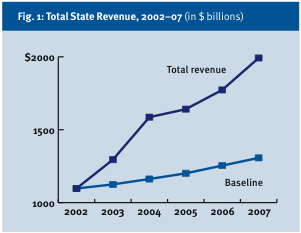Via Reason, from the man Obama personally appointed to lead the Deficit Commision
"America needs a 21st century economic plan because we now know the market-worshipping, privatizing, de-regulating, dehumanizing American financial plan has failed and should never be revived, worshipping the market again," Stern said in remarks at the annual conference of the liberal activist group Campaign for America's Future in Washington on Monday."It has failed America and everyone that works here," Stern said.
Stern said the changes that Obama and Democrats in Congress have made are nothing short of a "revolution" that will move the American economy from national to international.
"This not our father's or our grandfather's economy," Stern said. "We're as far today from the New Deal as the New Deal was from the Civil War. And we cannot drive into the future looking in the rear view mirror."
He said the progressive movement must build on the past and look to the future as the economy is transformed "from a manufacturing base, to a service, finance, knowledge, green, Internet, and bio-science economy."
"This revolution's going to only take 30 years," Stern said. "No single generation of people have ever witnessed this much change in a single lifetime. [...] And as we've witnessed now in the absence of a simple and realistic way forward, people "“ even us "“ sometimes resist the future or try to turn back the clock to days that are now long gone."
I am not sure I have ever heard anyone sound more like a scabby beauracrat in Atlas Shrugged. Can you believe this dweeb along with Barrack and the gang who can't shoot straight taking credit for the transformatoin of the economy? As if these guys have anything to do with the rise of new industries and technologies, except to make their birth and growth more difficult through strangling regulation and taxes.
The last paragraph about progressives and change is an interesting one in the context of this old post of mine, where I discuss how progressives most hate free markets for their constant change and unpredictability. Here is an excerpt:
Beyond just the concept of individual decision-making, progressives are hugely uncomfortable with capitalism. Ironically, though progressives want to posture as being "dynamic", the fact is that capitalism is in fact too dynamic for them. Industries rise and fall, jobs are won and lost, recessions give way to booms. Progressives want comfort and certainty. They want to lock things down the way they are. They want to know that such and such job will be there tomorrow and next decade, and will always pay at least X amount. ...
Progressive elements in this country have always tried to freeze commerce, to lock this country's economy down in its then-current patterns. Progressives in the late 19th century were terrified the American economy was shifting from agriculture to industry. They wanted to stop this, to cement in place patterns where 80-90% of Americans worked on farms. I, for one, am glad they failed, since for all of the soft glow we have in this country around our description of the family farmer, farming was and can still be a brutal, dawn to dusk endeavor that never really rewards the work people put into it.
This story of progressives trying to stop history has continued to repeat itself through the generations. In the seventies and eighties, progressives tried to maintain the traditional dominance of heavy industry like steel and automotive, and to prevent the shift of these industries overseas in favor of more service-oriented industries. Just like the passing of agriculture to industry a century ago inflamed progressives, so too does the current passing of heavy industry to services.
In fact, here is a sure fire test for a progressive. If given a choice between two worlds:
- A capitalist society where the overall levels of wealth and technology continue to increase, though in a pattern that is dynamic, chaotic, generally unpredictable, and whose rewards are unevenly distributed, or"¦
- A "progressive" society where everyone is poorer, but income is generally more evenly distributed. In this society, jobs and pay and industries change only very slowly, and people have good assurances that they will continue to have what they have today, with little downside but also with very little upside.
Progressives will choose #2. Even if it means everyone is poorer. Even if it cuts off any future improvements we might gain in technology or wealth or lifespan or whatever. They want to take what we have today, divide it up more equally, and then live to eternity with just that. Progressives want #2 today, and they wanted it just as much in 1900 (just think about if they had been successful "†as just one example, if you are over 44, you would have a 50/50 chance of being dead now).
Update: What does the line about shifting form a national to international economy mean? It must be some kind of progressive code phrase that does not mean what it sounds like, since most progressives and this administration tend to be opposed to free trade and have a strong tendency towards protectionism. After all, these are the same guys that sympathize with the anti-globalization rioters at various G8 conferences.
 working to slip a biofuel mandate that would add $150 million to New Yorkers’ heat expenses into the state budget just as a company he owns completes construction of the largest biofuel plant in the region.
working to slip a biofuel mandate that would add $150 million to New Yorkers’ heat expenses into the state budget just as a company he owns completes construction of the largest biofuel plant in the region.